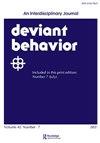UNPACKING the IMPACT of GRATITUDE on UNETHICAL BEHAVIOR
IF 1.4
4区 社会学
Q2 CRIMINOLOGY & PENOLOGY
引用次数: 0
Abstract
ABSTRACTUnderstanding and preventing unethical behavior is essential for social welfare. Prior research has shown that emotional processes have consequential effects on such behavior. The current work aims to unravel the mixed findings relating positive emotion to unethical behavior by suggesting that feeling gratitude may differentially influence one’s ethicality through three distinct pathways: cognitive (moral disengagement), motivational (greed), and relational (felt-security). Through our propositions, we advance a conceptual model for investigating the relationships among general positive emotion, gratitude, and unethical behavior, to gain clarity on these important connections. More broadly, researchers could use our model to illuminate a range of pathways linking gratitude and unethical behavior.KEYWORDS: GratitudePositive emotionUnethical behaviorMoral disengagementGreedFelt-security Disclosure statementNo potential conflict of interest was reported by the author(s).Additional informationFundingThis work is based partly on Junho Oh’s doctoral dissertation conducted at the School of Business and Technology Management at KAIST under the supervision of Sujin Lee; the research received financial support from the School.Notes on contributorsJunho OhJunho Oh is a PhD student in the Department of Business and Technology Management, Korea Advanced Institute of Science and Technology. His research focuses on topics such as unethical behavior, gratitude, and sense of power.Ye Kang KimYe kang Kim is an Assistant Professor in the Department of Global Business Management, Hongik University. She received her Ph.D. in Management from Korea Advanced Institute of Science and Technology. Her research focuses on topics such as creativity, gratitude, and job crafting. Her work has been published in leading journals such as Organizational Behavior and Human Decision Processes and American Journal of Psychology.Guihyun ParkGuihyun Park is an Associate Professor of Management in the Research School of Management, Australian National University. She received her Ph.D. in Organizational Psychology from Michigan State University. Her research interests include how people react to team members’ ideas and contributions; how a team, which consists of individuals, develops its own dynamics; and how intergroup relations and intragroup dynamics co-evolve over time. Her work has been published in leading journals such as Academy of Management Discoveries, American Psychologists, Journal of Applied Psychology, Journal of Management, and Organizational Behavior and Human Decision Processes.Sujin LeeSujin Lee is a Professor of Organizational Behavior in the School of Business and Technology Management, KAIST. She received her Ph.D. in Management from Cornell University. Her work on creativity, negotiation, ethical decision-making has been published in leading journals such as Organizational Behavior and Human Decision Processes, International Journal of Project Management, Journal of Experimental Social Psychology, Personality and Social Psychology Bulletin.揭示感恩对不道德行为的影响
摘要了解和预防不道德行为对社会福利至关重要。先前的研究表明,情绪过程对这种行为有相应的影响。目前的研究旨在揭示积极情绪与不道德行为之间的复杂关系,表明感恩可能通过三种不同的途径对一个人的道德产生不同的影响:认知(道德脱离)、动机(贪婪)和关系(安全感)。通过我们的命题,我们提出了一个概念模型来研究一般积极情绪、感恩和不道德行为之间的关系,以明确这些重要的联系。更广泛地说,研究人员可以利用我们的模型来阐明一系列将感恩和不道德行为联系起来的途径。关键词:感恩积极情绪不道德行为道德脱离贪婪感觉安全披露声明作者未报告潜在利益冲突。本工作部分基于Junho Oh在KAIST商业与技术管理学院在Sujin Lee的指导下进行的博士论文;这项研究得到了学院的财政支持。本文作者junho Oh是韩国科学技术院商业与技术管理系的博士生。他的研究集中在不道德行为、感恩和权力感等主题上。Ye Kang Kim是弘益大学全球商业管理系助理教授。她在韩国科学技术院获得管理学博士学位。她的研究主要集中在创造力、感恩和工作制作等主题上。她的研究成果发表在《组织行为与人类决策过程》和《美国心理学杂志》等重要期刊上。Guihyun Park,澳大利亚国立大学管理研究学院管理学副教授。她在密歇根州立大学获得组织心理学博士学位。她的研究兴趣包括人们如何对团队成员的想法和贡献做出反应;一个由个人组成的团队如何发展自己的动力;以及群体间关系和群体内部动态是如何随着时间共同进化的。她的研究成果发表在《管理发现学会》、《美国心理学家》、《应用心理学杂志》、《管理杂志》、《组织行为与人类决策过程》等重要期刊上。Sujin Lee,韩国科学技术院商业与技术管理学院组织行为学教授。她在康奈尔大学获得管理学博士学位。她在创造力、谈判、伦理决策等方面的研究成果发表在《组织行为与人类决策过程》、《国际项目管理杂志》、《实验社会心理学杂志》、《个性与社会心理学公报》等重要期刊上。
本文章由计算机程序翻译,如有差异,请以英文原文为准。
求助全文
约1分钟内获得全文
求助全文
来源期刊

Deviant Behavior
Multiple-
CiteScore
3.70
自引率
6.20%
发文量
64
期刊介绍:
Deviant Behavior is the only journal that specifically and exclusively addresses social deviance. International and interdisciplinary in scope, it publishes refereed theoretical, descriptive, methodological, and applied papers. All aspects of deviant behavior are discussed, including crime, juvenile delinquency, alcohol abuse and narcotic addiction, sexual deviance, societal reaction to handicap and disfigurement, mental illness, and socially inappropriate behavior. In addition, Deviant Behavior frequently includes articles that address contemporary theoretical and conceptual controversies, allowing the specialist in deviance to stay informed of ongoing debates.
 求助内容:
求助内容: 应助结果提醒方式:
应助结果提醒方式:


